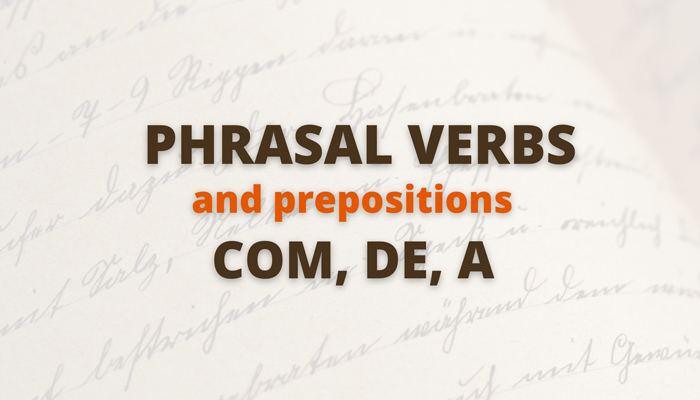In this article, we have collected the remaining variations of the phrasal verbs dar (to give), ficar (to stay), and passar (to conduct). Phrasal verbs are often forgotten, so our article serves to ensure that there is a place to quickly look and refresh your knowledge.
So, this time we will look at the meanings of phrasal verbs with the prepositions com, a and de.
Preposition “com”
1) Dar com
The meaning of the preposition “com” (c) helps us to remember the meaning of this phrasal verb, since the meeting always takes place between one object and another. So, as you might guess, dar com translates as “find“.
É difícil dar com um lugar livre neste estacionamento. (It’s hard to find a free space in this parking lot.)
As synonyms, you can use the verb “encontrar” (to find). In this case, we focus on the preposition.
2) Dar-se com
The preposition “com” is also involved here, but the reflexive particle “-se” changes the meaning of the verb.
Dava-me bem com o chefe e ele aumentou o meu salário. (I behaved well with the director and he increased my salary.)
The return particle “-se” always shows that any actions and manipulations are performed on oneself personally.
3) Ficar com
If we translate literally, then we get the meaning of “stay with”. If, for example, we take someone’s thing without permission and “stay with it“, then this is called appropriation. It is this prompt that helps us remember the meaning of the phrasal verb “ficar com” (to take for ourselves).
Alguém ficou com o caderno do João, porque ele perdeu-o logo após a aula. (Someone took Joao’s notebook because he lost it right after class.)
If we discard politeness, then “assign” means “steal“. That is, now you know how to mitigate accusation and suspicion.
Preposition “a”
1) Passar a
This combination of verb and preposition has two meanings. At first glance, they have nothing in common: “change” and “get promoted“. However, “raising the career ladder” is also a change, therefore, in fact, this phrasal verb has one translation.
Depois da viagem feita, passou a ser outra pessoa. (After the journey was completed, he became a different person.)
Com essa especialização, podes passar a enfermeira-chefe. (With this specialty, you can be promoted to head nurse.)
We can use the verb “tornar-se” as a synonym, although it is difficult to draw parallels. There is no reflexive particle and the pretext is completely different.
2) Passar de … a
Here we see two whole prepositions, but this just makes it easier to remember such a phrasal verb. Such a combination of the prepositions “de” (from) and “a” (to) always indicates a segment, a certain path from point A to point B in the literal and figurative sense. Only in conjunction with the verb passar do we have a change in the situation or conditions. For example:
Com experiência que tens, rapidamente passarás de enfermeira a cirurgiã. (With the experience you have, you will quickly grow from a nurse to a surgeon.)
Preposition “de”
We know that the basic meaning of the preposition “de” is “of”. In some cases, this knowledge is useful to us, and in some cases it is not at all. Let’s see.
1) Ficar de
This time, for the verb “ficar” there is a combination with the preposition “de“, which has no logical translation. Just remember that “ficar de” translates as “to agree“.
Ficámos de encontrar-nos hoje às 9.00, mas ele não veio. (We agreed to meet today at 9.00, but he did not come.)
The synonym this time is the verb “combinar“.
2) Passar de
Now the original value will help us. The phrasal verb “passar de” has the figurative meaning of “to go beyond”. This may be about patience, for example, or time limits. One thing we must remember is that “to go out” is exactly what it means to “go beyond“.
O chefe já devia ter ligado. Já passa das 15h00. (Shev should have called by now. It’s past 3:00 p.m.)
3) Não passar de
If “passar de” is “to go beyond”, then “não passar de” is just the opposite. Namely, not to be more than just someone or something.
Não tenhas medo. Esta não passa de uma aranha pequena. (Don’t be afraid. It’s nothing more than a little spider.)
This phrasal verb is interesting in terms of expressing our thoughts and emotions. It adds literary expressions. For example, the phrase above could have ended like this: “…é uma aranha pequena.” This is a statement of fact and at the same time a depreciation of the feelings of a person who was afraid of a spider. The expression “… no more than …” in this case is reassuring.
Similarly, this verb gives more emotional coloring in the phrase: Não acredite nele. Ele não passa de um mentiroso. (Don’t believe him. He’s nothing more than a liar.). Feels contempt, doesn’t it?
Conclusion
Combining basic verbs and different prepositions is easy and difficult at the same time. When you have a small set of vocabulary in your arsenal, you can express much more with phrasal verbs.
On the other hand, it is easier for someone to expand their vocabulary than to memorize the “formulas” of phrasal verbs. We believe that every person should choose the most effective way to communicate in Portuguese.
With or without phrasal verbs, it’s up to you!

